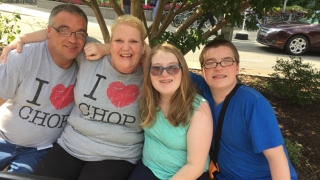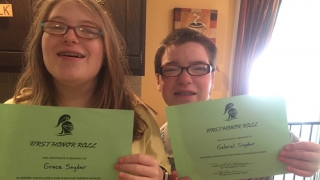Motility Disorder: Grace and Gabriel’s Story
Published on
Published on
Grace and Gabriel are 14-year-old twins who have been treated at Children’s Hospital of Philadelphia (CHOP) nearly their entire lives. Personalized treatment for their motility disorders has reduced their pain and discomfort, allowing them to pursue their passion for helping people in need.
 As babies, Grace and Gabriel had breathing and feeding problems such as apnea and severe reflux. As they neared their first birthday, it also became clear that the twins were not meeting the normal developmental milestones. Those physical and developmental concerns led to their initial referral to the Neuromuscular Program at CHOP, where tests identified a genetic muscle disorder. Their father, Tim, had the condition in a less severe form without realizing it.
As babies, Grace and Gabriel had breathing and feeding problems such as apnea and severe reflux. As they neared their first birthday, it also became clear that the twins were not meeting the normal developmental milestones. Those physical and developmental concerns led to their initial referral to the Neuromuscular Program at CHOP, where tests identified a genetic muscle disorder. Their father, Tim, had the condition in a less severe form without realizing it.
Over the years, the twins were diagnosed with other neurological conditions. Grace began to have seizures at age 2. Both were diagnosed with autism spectrum disorder and attention-deficit/hyperactivity disorder (ADHD), and Gabriel has Tourette’s disorder. The diagnoses at CHOP led to therapy and special support.
One constant throughout Grace and Gabriel’s lives has been problems with feeding and digestion. They needed feeding therapy when they were young to learn how to chew and swallow solid food, and they both struggled with bowel movements and constipation.
When they came to CHOP, they began to see Kristin N. Fiorino, MD, a pediatric gastroenterologist in the Suzi and Scott Lustgarten Center for GI Motility. Kari Baber, PhD, a psychologist with the Division of Gastroenterology, Hepatology and Nutrition, would play an important role in their care.
The Suzi and Scott Lustgarten Center for GI Motility has a multidisciplinary approach to care. In addition to seeing physicians, patients and their families are provided with additional support and resources. The support team includes dieticians, behavioral health professionals, nurses, social workers and child life specialists.
Dr. Fiorino diagnosed the twins with a form of a motility disorder that was interfering with the normal passage of food through their digestive systems. The body normally detects the presence of matter in the stomach, intestines and colon, and reacts with muscle contractions to move it along at a healthy rate. That wasn’t happening with Grace and Gabriel. Fecal matter would stay in their intestines and colon, backing up until it caused stomach pain and nausea.
Dr. Fiorino prescribed medications to speed up digestion. That helped, but didn’t completely solve their problems. Gabriel was hospitalized for a blockage at age 12, a problem resolved with a short-term increase in his doses of medication.
For Grace, Dr. Fiorino recommended saline enemas instead of the more commonly used phosphate enemas, which can have negative side effects. But Grace was becoming dependent on them, so they looked for another solution.
To better understand what was causing Grace’s motility problems, Dr. Fiorino ordered a manometry study. An inflatable sac was positioned at different points in Grace’s intestine and colon and filled with air to determine when she could feel the sensation of pressure. The test showed that she was not feeling full when her intestine and colon should have been sending signals to move food through the intestine or to go to the bathroom.
To counter this lack of sensation, Grace and Gabriel started gastrointestinal biofeedback therapy at CHOP. The therapy uses a computer and monitor to measure and display information about a body process that they are unable to feel. By seeing information on the screen, the twins are learning to control actions in their colons and bowels to achieve more normal function. The goal is to free Grace from dependence on enemas for bowel movements and to help Gabriel avoid problems like the one that led to his hospitalization at age 12.
Traci, the twins mother, and Tim appreciate the expert attention and caring support Grace and Gabriel have received from the medical team at CHOP over the years.
“I feel so safe when I go there. I always know that they’re available, 24/7. I can call at 3 a.m. when Grace is in pain and someone will be there who can help. And they’ve always listened to me. Dr. Fiorino wants to know what I have to say, because we know our kids.”— Traci
 Grace and Gabriel are both doing well now. The treatment and therapies for their various medical problems are working to keep them healthy and functioning.
Grace and Gabriel are both doing well now. The treatment and therapies for their various medical problems are working to keep them healthy and functioning.
When he was 11, Gabriel served as team manager for a local Pee Wee football team. In that role, he watched the games in uniform from the sidelines. That led to some frustration — he really wanted to play. It was clear to everyone but Gabe that he wasn’t physically up to it, but his team came up with a plan to make it possible. In the final game of the season, with the coaches and players on both teams in on the plan, Gabe was put in the game for a single play. When he was handed the ball, he ran all the way down the field for a touchdown. It was an emotional high for everyone, not just for Gabe. The players on both teams understood that their collaboration had given Gabe a shining moment to treasure.
When they are not making touchdowns, the twins’ deepest interest is in helping others. “They are the most empathetic, kind, sweet children you will ever meet,” says Traci.
Gabriel’s special passion is helping homeless people and veterans in need. He started making up bags he calls “Gabe’s Gifts,” with tissues, mints and gift cards for meals, and asked his parents to help him distribute them to the homeless. They found a shelter for homeless veterans and called to find out what would be helpful. Then Gabriel made a YouTube video in which he explained that “these people need love” and made a pitch for donations.
“People would come every day and drop off loads of sheets, blankets, jackets and socks,” says Traci. On Christmas Eve, they delivered everything to the shelter.
Grace shares the same passion for helping those in need, but her focus is on supporting people in law enforcement. She saved up money to bring food and coffee to a local State Police headquarters as a way to thank them for their service. Her parents made the arrangements, and Grace was welcomed and given a tour. She got to sit in a police car and wear one to the trooper’s hats.
“They are just so special. They are really cool kids. I feel so lucky.”— Traci